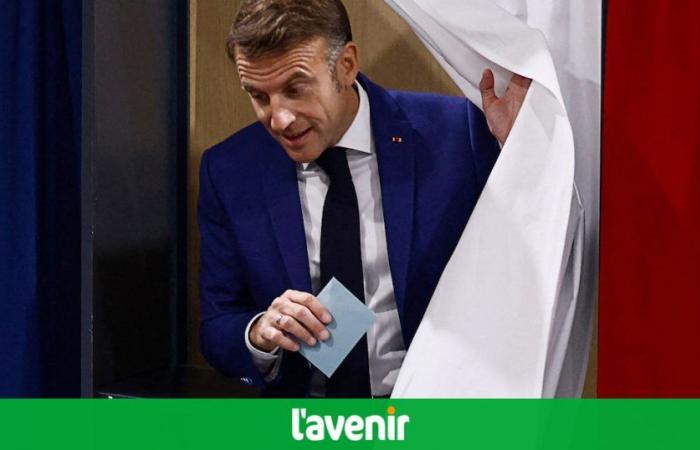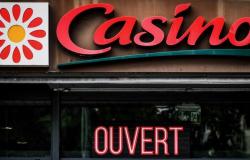
Three weeks after the earthquake of the European elections and the dissolution, the navy blue wave broke again. With more than a third of the votes at the national level, the RN and its allies are certainly less than the 36% to 37% announced by the polls in the last days of the campaign.
But the party with the flame struck a big blow from the start, by electing 39 deputies in the first round, starting with Marine Le Pen in her stronghold of Pas-de-Calais. Ditto for his lieutenants Sébastien Chenu (North), Julien Odoul (Yonne), Edwige Diaz (Gironde) and Laure Lavalette (Var).
As is customary, these newly elected parliamentarians will be able to go to the Assembly from 2 p.m., to take or regain their bearings – and no doubt a few photos along the way.
32 elected for the NFP
The far-right delegation could cross paths with that of the 32 elected officials of the New Left Popular Front, which already counts in its ranks the rebels Manuel Bompard, Mathilde Panot and Clémentine Autain, as well as the socialist Olivier Faure and the ecologist Sandrine Rousseau.
On the other hand, exit the boss of the communist party Fabien Roussel, swept away by the RN tidal wave in the North, while the maverick François Ruffin finds himself in an unfavorable toss-up in the Somme and could owe his salvation to the withdrawal of the candidate “Together for the Republic”.
One example among many of the dilemma facing the Macronists and the left, in the more than 300 constituencies in a three-way situation – or even a four-way situation in a handful of cases.
Candidates still in the running have until Tuesday 6 p.m. to decide whether or not to continue.
“The best choice”
On the side of the New Popular Front, the parties have already given a clear instruction: any candidate who comes in third place will have to withdraw. But for LFI, this will apply where the RN “came in first”, clarified Jean-Luc Mélenchon.
As a gesture of goodwill, the LFI candidate for the 6th constituency of Calvados has also announced his withdrawal in favor of former Prime Minister Elisabeth Borne. “We are going to save her,” even affirmed the leader of the PS Olivier Faure.
Anything but the “disastrous project” of the RN, this is also the line defended by the current occupant of Matignon, Gabriel Attal, who also acknowledged that “this will involve the withdrawal of (his) candidates” in “third position”.
But only to benefit “another candidate who defends the values of the Republic”, he added, stressing that the presidential camp will still be present “in several hundred constituencies” next Sunday and will constitute “the best choice to avoid that the RN does not have an absolute majority.
Because as things stand, the projections of the polling institutes anticipate a large relative majority of at least 240 seats for Jordan Bardella’s troops, or even a short absolute majority of up to 295 seats.
A prospect which worries all the way to the top of the State, where Emmanuel Macron urged “a large, clearly democratic and republican gathering for the second round”. Without specifying whether LFI falls within this scope.
The subject continues to tear apart the executives of the outgoing majority: out of the question for François Bayrou, Edouard Philippe, Yaël Braun-Pivet or Aurore Bergé. But the candidate ministers Sabrina Agresti-Roubache and Marie Guévenoux have already chosen to withdraw and several supporters of the left wing are arguing for moving away from the logic of “neither RN nor LFI”.
Divided over the course of action, the government will have one last opportunity to meet again before the second round: the head of state has summoned his ministers to the Elysée at 12 p.m.
A “disaster” for Macron, according to the press
President Emmanuel Macron was hoping for a “clarification” but the first round of the legislative elections, with the National Rally largely in the lead and at the “gates of power”, constitutes a “disaster” for the head of state, underlines the press, which calls almost entirely to act as a “barrier” to the extreme right.
With a surprise dissolution announced just after the European elections, Emmanuel Macron “made a bet. He lost it. Worse, it’s a disaster for his camp”, notes Stéphanie Zorn in La Voix du Nord.
“When historians look at the dissolution, they will only have one word: disaster! We could not imagine it more complete,” adds Alexis Brézet in Le Figaro. “France finds itself faced with the double perspective of political adventure or institutional blockage: the two facets of a regime crisis. Thank you, Macron!”
The same observation was made by Stéphane Vergeade in La Montagne: “It is understood that Emmanuel Macron has lost his bet, launched in the solitude of a Sunday evening, the reasons for which remain misunderstood for a long time.”
“To his claim to embody the only alternative to chaos,” writes Dov Alfon in Libération, “the French responded by holding him responsible for this chaos; to his plea for a clear majority to act in serenity and harmony, they inflicted on him an additional torture of isolation.”
“Clarification was widely desired throughout the debates. Clarification there has been, and not just a little. France is waking up to the unprecedented face-off between the two extremes,” Patrice Chabanet believes in the Journal de la Haute-Marne.
guillementTo his claim to embody the only alternative to chaos, writes Dov Alfon in Libération, the French responded by holding him responsible for this chaos; to his plea for a clear majority to act in serenity and harmony, they inflicted on him an additional torture of isolation.
In the Dernières Nouvelles d’Alsace, Pascal Coquis even sees it as “the end of Macronism”. “That the party in power pays the high price of this electoral adventurism is therefore a matter of implacable political and mathematical logic that only the blindness of a head of state completely obsessed with himself will have hidden”, he states.
It is indeed “the end of an era”, is the headline in Les Echos.
But now a decisive week of political negotiations is beginning. “After the shock, unite”, is the headline in Libération, stressing that “only a republican barrier can prevent the worst”.
On July 7, “it’s about choosing between the worst and the less worst, it’s about going to the polls to keep in mind what history teaches us about the extreme right and the damage that she talks where she settles”, underlines in Le Midi Libre, Olivier Biscaye.
guillementFrance wakes up to the unprecedented face-off between the two extremes
“This reality is not anecdotal, it should at the very least generate a burst of unity and perspective, a burst of coherence and exemplarity,” he continues.
But for Alexis Brézet in Le Figaro, “between Bardella and Mélenchon, who, in conscience, would want to put a sign of equality?”. “The RN program is certainly worrying in many respects, but on the other hand: anti-Semitism, il-leftism, class hatred, tax hysteria…”, he says.
“France has reached a tipping point,” writes Stéphane Vergeade in La Montagne, and “the coming week is unlike any other. It places us face to face with ourselves. The moment demands clear choices and words.”
“From this disorder a majority can still emerge that lives up to the values of the Republic,” believes Séverin Husson in La Croix.
But Emmanuel Macron “has thrown France into an infernal whirlwind” and it is “not sure that alliances, coalitions or a hypothetical republican arc will succeed in countering the navy blue tsunami carried by 11.5 million voters”, warns Carole Lardot in L’Union.
guillementFrance has reached a tipping point





